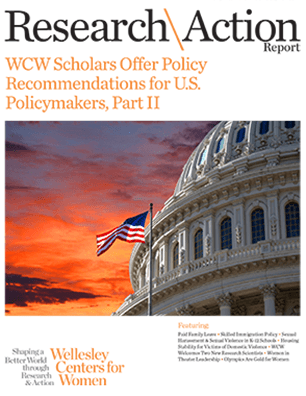Sari Pekkela Kerr, Ph.D, senior research scientist/economist, Wellesley Centers for Women
U.S. Does Not Have Paid (Federal) Family Leave
Although research shows clear benefits of family leave, the U.S. remains the only developed country that does not offer paid family leave for its workers. This hampers women’s work efforts and endangers the wellbeing of children.
Promising Policy Findings

Research has demonstrated how family leave significantly improves the economic and health outcomes of both babies and their parents. While the U.S. mandated (unpaid) family and medical leave already in the 1990s (FMLA), many families do not have the economic means to afford any duration of unpaid leave for the parents. Fathers in particular are unlikely to take any leave after the birth of a new baby. Most arguments against paid leave in the U.S. are related to the performance of businesses, although there is not much data about the impacts of paid leave on firms that support such arguments. Recent research shows that the practice of only guaranteeing unpaid leave, and leaving the decision to offer pay during leave, to firms leads to very uneven access and usage of family leave across the family income distribution. More upper- and middleclass families are able to utilize and benefit from paid leave, while less economically secure families are more likely to take shorter, unpaid leaves. On the other hand, studies evaluating the California Paid Leave policy note that leave-taking increases if the leave is paid, but employer businesses did not find this additional leave-taking to be harmful for their performance. Moreover, Scandinavian studies find that paid family leave designated for fathers has the potential of transforming the culture around newborn care—potentially equalizing the labor market outcomes of new mothers and fathers.
Approaches and RecommendationsRecommendations for enhancing our focus on paid leave include:
- Fund research that evaluates the business case for paid leaves. Many firms are currently offering paid leave to their workers as an employee benefit. This has been argued to improve the retention of skilled workers, which in turn can lead to large savings in recruiting and training costs. More research is needed to fully understand the economic impact of paid leave on firms and these studies could be funded through public and private partnerships. The Department of Labor is already offering some funding related to paid leaves, and could extend such funding with more focus on the firm-side analyses.
- Support states in their efforts to introduce new paid leave statutes. Many states are in the process of evaluating a paid leave law. As more states introduce such laws we will be able to conduct research on the impacts of the paid leave on women, families, and firms using U.S. “case studies”. This will be helpful both in terms of advancing the availability of paid leave as well as for providing a more research-based approach for a federal paid leave policy.
- Involve firm-representatives in the policy discussion around paid leave. Many firms have successfully implemented their own paid leave policies, and can share advice on the best practices. Also, having more advocates for paid leave in the business community will help the understanding among firms as to why a paid leave policy may actually be helpful for their business efforts.
- Consider novel ways of funding the paid leave. In most countries, paid leaves are (at least partly) funded via tax dollars or an unemployment insurance type system. Minimizing the monetary cost to firms from the implementation of paid leave will help boost the support for such an initiative.


